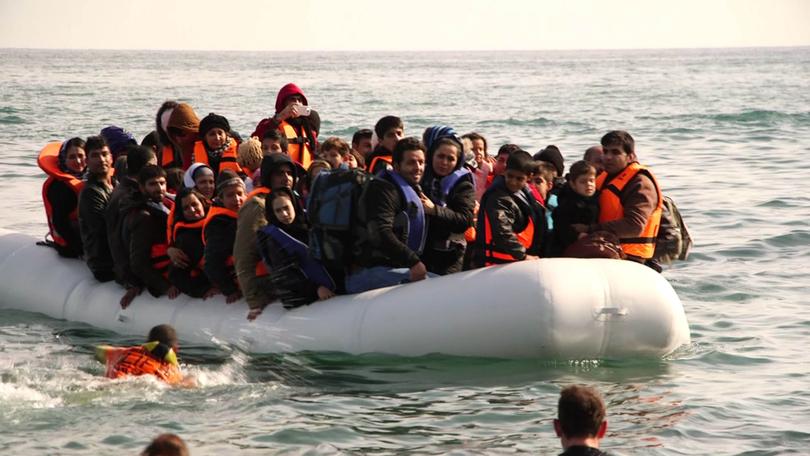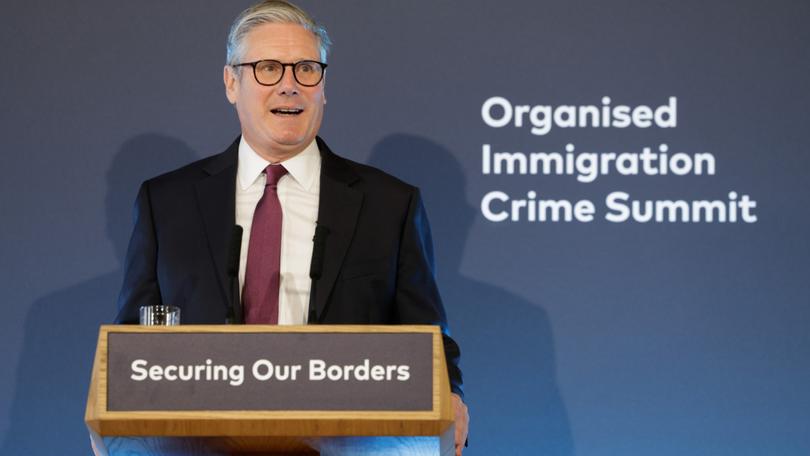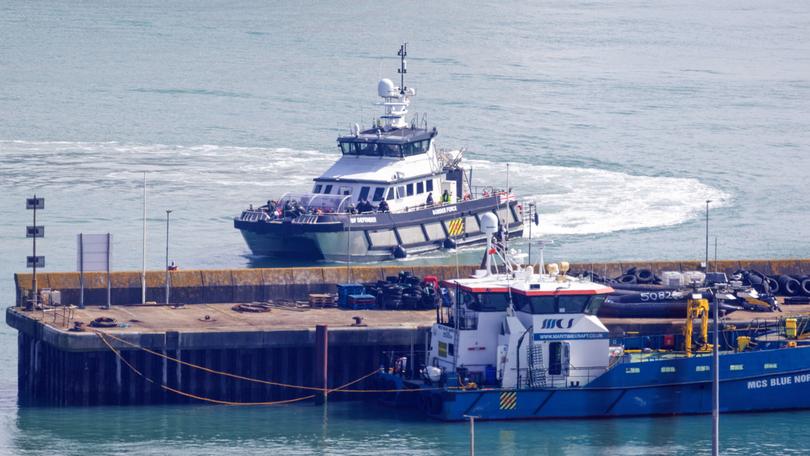THE ECONOMIST: TikTok ads, boat shopping and fake reviews all part of the business of people smuggling
Transporting people across borders is a difficult job for an entrepreneur

“There are different types of smuggler,” explains an Iranian man who crossed the English Channel in an inflatable boat and was subsequently given asylum in Britain. “Some of the smugglers have a brand. They are famous for using brand new dingies, and for using lifejackets. Others are cheap, but not safe at all. They have used and faulty dingies.”
The smugglers who transported 36,800 migrants across the English Channel last year have been called many things. Opening a summit on illegal immigration on March 31, British Prime Minister Keir Starmer described them as evil and exploitative. So they are. But they are also entrepreneurs. Smugglers sell a service that is in high demand, albeit a dangerous one that killed 82 people last year, according to the Missing Migrants Project, run by the UN. Seeing them as businesspeople operating in a highly competitive, multi-million-euro market helps to explain why their boats are so hard to stop.
Success in the smuggling business means bringing together migrants, boats and engines on the coast of Belgium or France, under the noses of the police. To do this, smugglers must be adept at marketing, procurement, logistics, accounting and human relations. They face difficulties that many businesspeople do not have, such as a multitude of languages and the impossibility of suing clients who try to get out of paying. Only skilled entrepreneurs are likely to prosper.
Sign up to The Nightly's newsletters.
Get the first look at the digital newspaper, curated daily stories and breaking headlines delivered to your inbox.
By continuing you agree to our Terms and Privacy Policy.Like many other travel businesses, smugglers advertise their services online, on social-media platforms such as TikTok. The platforms and the police try to eradicate them — since 2021 Britain’s National Crime Agency (NCA) has helped remove some 18,000 social-media accounts, advertisements and web pages. The advertisements presumably work, because the British government runs social-media campaigns of its own, trying to deter would-be migrants in Albania, Iraq and Vietnam.
Adverts are often generic, with a boat, smiling migrants and a phone number. But Dan Barcroft, senior manager of the NCA team covering organised immigration crime, has seen slicker campaigns that build brands. In some, asylum-seekers praise particular smugglers. Others make outlandish claims about the quality of the channel crossing. “A VIP service is being promised, with food and drink on board,” says Mr Barcroft. “That’s just a lie.” Smugglers are not, of course, subject to the Advertising Standards Authority.

Word of mouth can be just as important for recruiting customers. West of Dunkirk in northern France, in a squalid woodland camp where about 800 migrants live in tents, your correspondent meets a young Afghan man who says he has paid €1500 ($2600) for passage to Britain. He applied for asylum in Belgium three years ago, and was rejected; he heard about a channel smuggler through the migrant grapevine.
The person who connected him to his smuggler might not have been motivated purely by altruism. Smugglers employ recruiters in places where migrants gather. Researchers at the Global Initiative against Transnational Organised Crime (GI-TOC), a Swiss research outfit, found one in Belgium who was paid €100-200 for every new lead. Smugglers also use brokers, who assemble groups of migrants and buy passage for all of them.
A smuggling outfit that has found enough migrants to fill a vessel, whether through direct marketing, recruiters or brokers, needs a boat and an outboard motor. A few years ago those could be purchased from sporting-goods shops in France. As the police cracked down, smugglers became importers, bringing specially made boats from China and Turkey. That is more difficult, but the advantage is that buyers can specify what they want. What they want, above all, is large dinghies that can maximise profits per launch. So far this year the average number of migrants per boat reaching Britain is 56, up from 13 in 2020.
Supply-chain
Boat supply has become a distinct business. Dealers supply more than one smuggling outfit, and a wise smuggler will use more than one dealer. Germany is the centre of the trade. In December police raided homes and warehouses in the south and west of the country, recovering 21 boats, 24 motors and items including lifejackets.
Dealers may be both wholesalers and retailers. In October an undercover BBC journalist met a man in Essen, in north-west Germany, who offered to sell him a boat and an engine for €8000, or to deliver the goods to a site a few hundred metres from the French coast for €15,000. A canny buyer could probably drive both prices down.

The NCA says that boats are becoming more expensive, partly because of police work at the border between Turkey and Bulgaria, where dogs sniff them out. Criminal entrepreneurs have responded by adopting different logistics practices. A few years ago, says Felix Sinclair, head of the unit that gathers intelligence on immigration crime, vehicles would carry several boats to the coast at once. Dinghies were often buried among sand dunes. These days they are transported singly, exactly when they are required. “They move just enough, just in time,” he says — just like a car manufacturer.
One of the hardest aspects of the smuggling business is the imperative to stay away from the coast, lest you be arrested.
“The smuggler never accepts the risk. They’re very intelligent,” says an Afghan man who arrived in Britain in an inflatable boat and claimed asylum. He communicated with his smuggler via an encrypted messaging app. “He might have been in France, he might have been in Afghanistan,” he says.
Instead, smugglers employ numerous workers known to the French authorities as petites mains, or small hands. These men (as they usually are) liaise with migrants, transport people and equipment to beaches, and inflate boats. Xavier Delrieu, the head of OLTIM, which tackles immigration crime in France, says they are a mixture.
Some are would-be migrants who cannot pay for passage and are trying to earn a place on a boat; others are migrants who have decided to stay and work in northern France; still others are French people who have fallen on hard times.

The small hands take great legal risks in return for a few hundred euros per boat, or the equivalent sum in free passage. These subcontractors are not as pathetic as they look, however. Some run smuggling sidelines, adding their own passengers to boats. Others lead poor migrants to beaches, where they try to rush onto departing boats — a practice that has led to deaths.
Every boat needs a pilot, and these tend to be poor asylum-seekers. In 2024 Ibrahima Bah, a Senegalese man, was convicted of manslaughter in Britain after the inflatable boat that he was steering folded up, killing four people. Mr Bah, who had gained experience piloting a boat across the Mediterranean, was offered free passage across the channel if he agreed to steer. When he saw the boat, he balked, saying it was too full. The smugglers pressed him.
Most voyages do not end so catastrophically. But boat pilots are often prosecuted under British immigration laws if they happen to be photographed by border guards. Victoria Taylor, a researcher at the University of Oxford, has discovered that 69 pilots were charged in the first three quarters of 2024. The biggest group, with 19 charges, were from Sudan. Sudanese people are often both poor and Arabic-speaking, which makes them easier to tutor, Arabic being commonly spoken among smugglers and small hands. Pilots tend to plead guilty and are jailed for nine months.
Moving migrants is not enough, of course. Money must move, too. Migrants and smugglers usually arrange payment through hawaladars — informal bankers who rely on trust. Mr Sinclair of the NCA says that funds are often held in escrow, and released when a migrant arrives safely. Smugglers may photograph migrants or their passports to prove they were on a boat, and to intimidate them.
Pricing is highly variable. It fluctuates according to demand and smugglers’ calculations about migrants’ ability to pay. Sub-Saharan Africans might be charged €900 to €1,200, whereas Iraqi Kurds and Syrians pay €1200 to €1500 and Albanians and Turks pay even more. Some migrants pay only for the crossing, whereas others, notably Vietnamese, purchase bundles of services that take them across Asia and Europe to Britain. Rather than living in squalid camps, they stay in safe houses away from the coast, and are brought to beaches when boats are ready.
When reporting raids and arrests, police and prosecutors tend to argue that smuggling is hugely profitable. A single boat, they say, can bring in more than €100,000. But the police sometimes overstate the prices that are paid, and they overlook the cost of running a smuggling network. Boats are expensive, and some are seized: the French police claim to prevent about half of migrants from setting off. Pilots often travel free. And many small hands must be paid.
The outlook
Issa Mohamed Omar, a Somali man who tried to reach Britain in a boat, recently gave a detailed account of smuggling to a public inquiry. He describes a labour-intensive operation, involving negotiators, interpreters and boat dispatchers.
The smugglers’ flunkies were so numerous that they occupied an entire section of the camp in northern France where he was staying. Mr Omar never made it to Britain. His boat collapsed mid-Channel, killing everyone except him and one other man. When he closes his eyes, he still hears the screams of the dying.
Tuesday Reitano, of GI-TOC, suggests that the smuggling business is not as profitable as it looks. Established Albanian and Italian criminal groups could have muscled in but chose not to, perhaps because migrant-smuggling attracts so much police attention, which could have turned to their drug-trafficking activities. Instead the business is dominated by Iraqi Kurds, who learned the trade while migrating.
Migrants sometimes refer to smugglers as “mafia”, and they can be violent to migrants and to other smugglers. But they seem to be loose networks of entrepreneurs rather than stable, hierarchical criminal organisations. Barriers to entry are low, because of the rise of ancillary businesses such as migrant recruiters, brokers and boat dealers, which supply more than one network. Mr Delrieu says that Afghans are getting more involved in the trade, without provoking obvious hostility from the established Iraqi Kurds.
Police action may have prevented monopolies from forming. The huge number of gendarmes and drones in northern France (many paid for by British taxpayers) has driven smugglers to spread out. Since August 2024 they have launched boats from as far east as De Panne in Belgium and as far south as Dieppe in Normandy. Along that more than 200km-long stretch, many smugglers could be operating without knowing of the others’ activities.
Competition has helped to keep prices down. Pistiwan Jameel, a broker in Britain who was found guilty of facilitating illegal migration and was sentenced in February, was recorded complaining about this. And competition has probably made the smuggling industry resilient. Another smuggler, broker, driver or boat supplier is always ready to take on more work if someone is arrested.
Britain and other European countries can disrupt smuggling businesses and raise the cost of doing business, although they might make cross-Channel journeys more lethal in the process. They probably cannot end the trade, unless they stop granting asylum altogether or provide another way for claimants to reach Britain. The country accepts only a small number of un-vetted refugees, which might provide people with an alternative to dangerous, watery journeys.
“If you think the smugglers are bad people, I agree with you,” says the Iranian refugee quoted at the beginning of this article.
“It’s a long and unsafe journey, a dangerous journey. But do you think it’s possible to go to the British embassy in Iran and get a visa?”
Originally published as How to run a smuggling business
